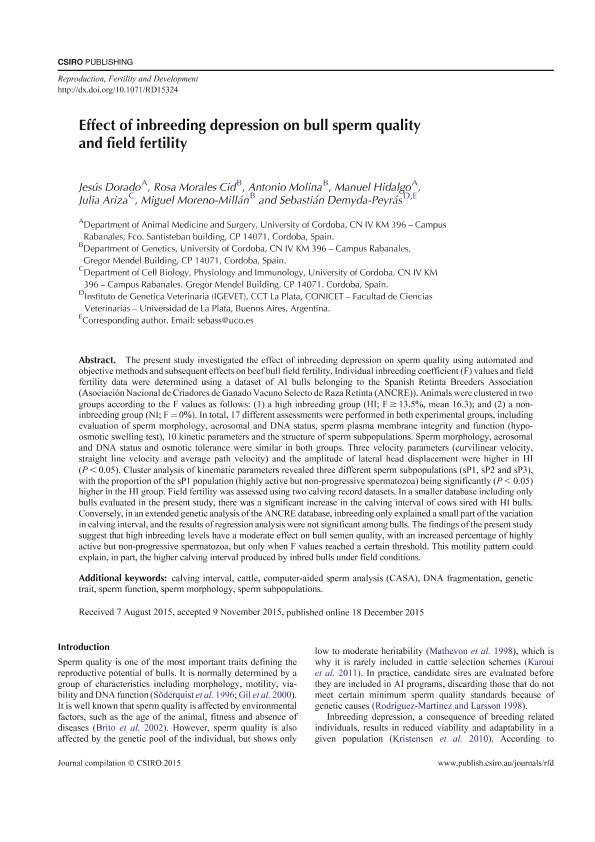Artículo
Effect of inbreeding depression on bull sperm quality and field fertility
Dorado, Jesús; Morales Cid, Rosa; Molina, Antonio; Hidalgo, Manuel; Ariza, Julia; Moreno Millán, Miguel; Demyda-peyrás, Sebastian

Fecha de publicación:
03/2017
Editorial:
Csiro Publishing
Revista:
Reproduction Fertility and Development
ISSN:
1031-3613
Idioma:
Inglés
Tipo de recurso:
Artículo publicado
Clasificación temática:
Resumen
The present study investigated the effect of inbreeding depression on sperm quality using automated and objective methods and subsequent effects on beef bull field fertility. Individual inbreeding coefficient (F) values and field fertility data were determined using a dataset of AI bulls belonging to the Spanish Retinta Breeders Association (Asociación Nacional de Criadores de Ganado Vacuno Selecto de Raza Retinta (ANCRE)). Animals were clustered in two groups according to the F values as follows: (1) a high inbreeding group (HI; F≥13.5%, mean 16.3); and (2) a non-inbreeding group (NI; F≤0%). In total, 17 different assessments were performed in both experimental groups, including evaluation of sperm morphology, acrosomal and DNA status, sperm plasma membrane integrity and function (hypo-osmotic swelling test), 10 kinetic parameters and the structure of sperm subpopulations. Sperm morphology, acrosomal and DNA status and osmotic tolerance were similar in both groups. Three velocity parameters (curvilinear velocity, straight line velocity and average path velocity) and the amplitude of lateral head displacement were higher in HI (P<0.05). Cluster analysis of kinematic parameters revealed three different sperm subpopulations (sP1, sP2 and sP3), with the proportion of the sP1 population (highly active but non-progressive spermatozoa) being significantly (P<0.05) higher in the HI group. Field fertility was assessed using two calving record datasets. In a smaller database including only bulls evaluated in the present study, there was a significant increase in the calving interval of cows sired with HI bulls. Conversely, in an extended genetic analysis of the ANCRE database, inbreeding only explained a small part of the variation in calving interval, and the results of regression analysis were not significant among bulls. The findings of the present study suggest that high inbreeding levels have a moderate effect on bull semen quality, with an increased percentage of highly active but non-progressive spermatozoa, but only when F values reached a certain threshold. This motility pattern could explain, in part, the higher calving interval produced by inbred bulls under field conditions.
Archivos asociados
Licencia
Identificadores
Colecciones
Articulos(IGEVET)
Articulos de INST.DE GENETICA VET ING FERNANDO NOEL DULOUT
Articulos de INST.DE GENETICA VET ING FERNANDO NOEL DULOUT
Citación
Dorado, Jesús; Morales Cid, Rosa; Molina, Antonio; Hidalgo, Manuel; Ariza, Julia; et al.; Effect of inbreeding depression on bull sperm quality and field fertility; Csiro Publishing; Reproduction Fertility and Development; 29; 4; 3-2017; 712-720
Compartir
Altmétricas
Items relacionados
Mostrando titulos relacionados por título, autor y tema.
-
de La Vega Beltrán, José Luis; Sánchez Cárdenas, Claudia; Krapf, Dario ; Hernández González, Enrique; Wertheimer Hermitte, Eva Victoria ; Trevinio, Claudia L.; Visconti, Pablo E.; Darszon, Alberto (American Society for Biochemistry and Molecular Biology, 2012-12)
-
Artículo Sperm competition and reproductive mode influence sperm dimensions and structure among snakesTourmente, Maximiliano ; Gomendio, Montserrat; Roldan, Eduardo Danilo; Giojalas, Laura Cecilia ; Chiaraviglio, Margarita (Wiley Blackwell Publishing, Inc, 2009-10)



